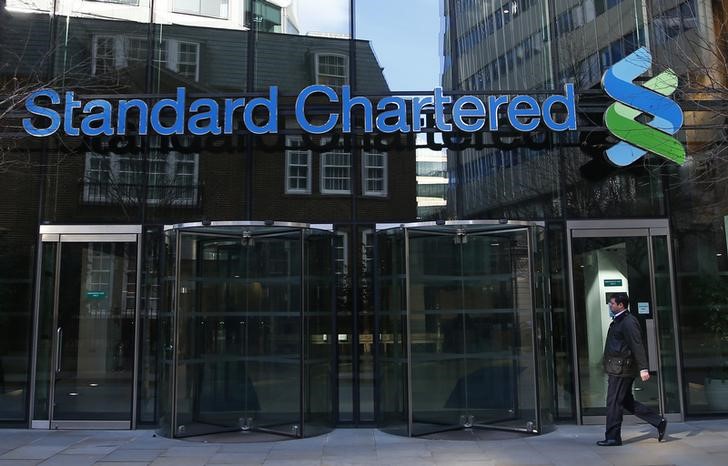By Steve Slater and Sinead Cruise
LONDON (Reuters) - Standard Chartered (L:STAN) halved its dividend and said it would raise capital from investors if needed, as new Chief Executive Bill Winters outlined plans to revive the bank after a slump in profits laid bare the scale of its problems.
The bank's first-half pretax profit fell 44 percent as losses from loans in India and to commodities firms jumped and growth in its key Asian markets slowed.
Winters, a former JP Morgan (N:JPM) investment bank boss who took over in June after the ousting of long-time predecessor Peter Sands, did not pull punches on past strategic errors.
"Today's results clearly show the bank has some real challenges. We're working through a legacy of a focus on growth over risk discipline and returns, together with an emerging markets slowdown," Winters told reporters.
"We've also been too slow to take our decisions, whether on costs, people or strategy," he said.
Standard Chartered has had a troubled three years, hurt by weakness in many of its key emerging markets as well as fines from U.S. regulators for misconduct and strained relations with top shareholders.
It halved its first-half dividend to 14.4 cents a share and said it expected to cut the full-year payout by the same amount.
That would save about $1 billion (640.61 million pounds) in 2015, which could reduce the need for a bumper rights issue. Winters could instead opt for a quick-fire sale of shares later this year, which could raise up to $4 billion, analysts said.
Many analysts had previously said Winters needed to raise at least $5 billion to bolster the bank's capital reserves and kick-start a recovery.
"We think it's a great move (the dividend cut) and minimises the probability of a capital raise north of $5 billion in the months to come," said Chirantan Barua, analyst at Bernstein.
As a result, its shares rose 4.3 percent to 993.4 pence at 1210 GMT. The shares are up 3 percent this year, lagging an 18 percent rise by European banks as a whole (SX7P).
The dividend cut and a reduction in the bank's assets helped Standard Chartered improve its core capital ratio to 11.5 percent at the end of June from 10.7 percent at the start of the year, despite its weak profits. That left it within its 11 to 12 percent goal six months ahead of target.
Winters said he would seek more cash from investors if necessary. "If we conclude the bank needs capital, we will seek that from our shareholders," he said.
BAD DEBTS RISE
Winters said he was reviewing if the bank's capital was strong enough to withstand rising bad debts, a weak earnings outlook and a "stress test" of its Asian loans later this year by the Bank of England.
He said he would set out his plans at the end of the year.
"We will take that body of information and make a decision at the time whether capital is needed," he said.
Losses from bad debts jumped 15 percent from a year ago to $1.65 billion, which included $263 million of markdowns on a small number of loans made before 2013.
The bank did not specify where they were, but it could include a $1 billion loan it made to Indonesian coal mining company Borneo Lumbung Energi & Metal (JK:BORN), which the bank has been trying to restructure in an effort to recoup it, according to details in the miner's accounts.
"Mistakes have clearly been made where decisions were taken which would now be outside of our risk framework and pricing discipline has also been lacking," Winters said.
The bank also took a $90 million hit from an alleged fraud in its private banking business, which the bank said was being investigated and related to a single loan. It refused to give further details.
Winters has already shaken up the senior management team and structure and appointed a new risk officer on Wednesday.
He said improving return on equity would be his main priority and that 10 percent would be "a minimum acceptable level", compared with just 5.4 percent in the first half.
It said it had cut 4,000 staff since the start of the year, or just over 4 percent of the total, as part of its plan to streamline operations and cut costs, and said there could be more job losses. It is aiming for $1.8 billion of cost savings by the end of 2018.

The bank said pretax profit in the first six months of the year dropped to $1.82 billion from $3.27 billion a year ago, while income fell 8 percent on the year.